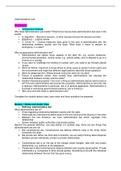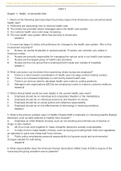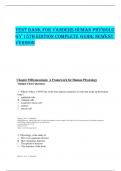Module 1
• Introductory Podcast
Why does Administrative Law matter? What kind of issues does administrative law raise in the
world?
• A: Algorithm -- Biometric decision, to what standard should the decision be held
• B:Balance -- Judicial review
• C: Covid 19 -- Corona measures have gone to the core of administrative law, the
relationship between society and the state. What does it mean to declare an
emergency in a state?
Why study/practice administrative law?
1. Administrative law affects many aspects of the daily life, e.g. corona measures,
environmental protection, routine areas, e.g. vehicle safety, who is allowed to go to a
cinema on a sunday
2. If you want to challenge the funding of nuclear stuff, you need to go through judicial
review
3. Work for NGOs: Important to know where to bring cases to protect human rights and
the environment and hope that different legal systems deal with those questions
4. Work for global law firm: Where should I bring the claim for my client
5. Pursue a academie career: How exactly does administrative law regulate the
relationship between society and the state?
6. Another theoretical question: Can such a thing as administrative law be said to exist at
all? The term administrative law sounds like a paradox. Administrative is concrete, law
is abstract. Administrative is particular, law is of general application. Administrative is
involved in exercising governmental authority, law is limiting it.
7. Who wins and who loses in administrative law?
Complete the module before class, take notes and have questions be prepared.
Module 1 Slides and Audio Clips
• Defining ‘administrative law’
What administrative law is?
• A law regulating relationship between society and the state
• Historically be understood to define state on the one hand and the citizens on the other
• Between the two divisions, we have administrative law which regulates their
relationship
• Govern between public authorities and private parties
Beyond this general definition, can also define it in another way, there are two things that
administrative law are not:
1. Not constitutional law. Constitutional law defines different roles of the entity which
comprises the state.
2. Not private law. When we think about contracts, we are really thinking about disputes
between private individuals, private to private relationships.
• Constitutional law is on the top of the triangle (state triangle), deal with very public
relationship, e.g. judiciary to the legislature
• Private law is also horizontal level, dispute between two roughly equal parties. Private
individuals e.g. companies or other private parties. Something to do with the individual
relationship between the two that has gone wrong.
,Best way to see administrative law is to think about it as governing the vertical relationship
between constitutional law and private law. It is the thread that runs from the public arena to
the private arena. We will have one private and one public party, mostly a government. Always
a private-public relationship. It is known as Applied constitutional law in Germany.
Two things to reflect on:
1. If someone asks you what is administrative law about, what would your answer be? (
- Actions that it takes on a domestic level, trying to introduce some elements or rights or
norms./ Administration trying to protect individual rights
→ E.g. If we talk about climate change, you might be thinking about how do we use juridical
review mechanism to challenge the government; e.g. challenge legality of corona
measurements
2. Some of the key themes/ concepts that you would see administrative law being
implemented
• Rule of law, make sure the government works
• Democracy
• Separation of powers
Audio Clip 2
• Sources and Constitutional guarantees of judicial review
Case book Ch.1 → 4 parts, we will discuss two parts here.
The Sources of administrative law: = the questions of:
• Where to find administrative law?
• Where do you go and which rules you consult whenever you are trying to bring a case
within a particular jurisdiction?
• Where to find administrative law? Goes from things like the constitution of the state or
the basic law to legislation enacted by Parliament or Assembly or Case law
• Think about the differences between legal systems regarding where to find the source
of administrative law, we can imagine a scale from written or statutory sources to more
judge made sources
• Statutory end: Germany, EU
• Judge-made, case law: England and Wales, France, NL
→ This is a spectrum, you can’t say England and Wales only have judge-made law because
they also have administrative procedure codified in their jurisdictions
- Whether or not a particular state has a codified for effective judicial protection within their
constitution: Divide between those that have protection and those don’t have it in the
constitution but have it elsewhere
E.g. European Union: Do have a right of judicial protection in the Treaty on EU/Treaty on
Functioning of EU
No constitutional protection: e.g. France, instead of using the constitution, they have a general
principle of law regarding a right to judicial review.
Audio Clip 3: Objective and subjective models of judicial review
As tools to make sense of the material, these models are a strict category.
The point for having these models:
• To be able to understand the legal system better and to more easily compare them
when confronting administrative law problem
• Purpose of review: Primarily to govern and guarantee respect for the law by the
administration in order to preserve the general interest
,Objective Models (England and Wales, France)
Purpose: Guarantee respect of the law by the institution to preserve general interest
• What matters within the systems that have an objective approach: Compliance with
the legal obligations.
• The right to challenge those administrative actions will derive from that obligation
because within systems that employ this model (e.g. England and Wales) are more
about respect of law and compliance, the courts have exercised more limited control
or lower intensity review than in some other systems. They do have much broader
range of groups and individuals that can actually bring a case even if they will review
the action at a much lower level once the case has been heard
• Whether the administration has acted within its powers accordingly – Focus would be
annulment
• Rights flow from the obligation that administrations have to comply with the law to not
act beyond its part
Subjective models (Germany, partly in the NL, France also have some subjective
characteristics)
• European Union was initially influenced by the subjective approach
• Concern with safeguarding individual rights
• The basis of this model: Obligation of the administration was understood to be
determined by those subjective rights
• It’s the exact opposite of the objective models
• About administrative obligations flowing from individual rights → There has been more
of a trend to control the actions of the administration, e.g. higher intensity of review,
wider range of remedies to reflect the fact that the point is to safeguard individual rights,
e.g. in France – subjective approach
Why are the models useful for us?
• Help to see what the underlying rationale will often be for these different systems
• The kind of justification and reasoning the judges rely on in the judicial review
proceeding
• Although it’s not impossible, it’s less likely to find a English law judge citing the need
to safeguard individual rights as a base for judicial review than in Germany
• Both models point to one question: How to balance the general interest
Audio clip 4: Reading the Bignami article
• Read it in depth because we will return to the article later in the course
• She begins with history and then move on to discuss administrative actions
• Summarize: She looks the historical development of different legal systems,
overarching sense of the differences, 3 different types of way to compare those
systems and end with a question of convergence: Common level or common principle
of administrative law which is not developed on a global level
2 useful takeaway points:
1. Definition of administrative law
• She says that it works as a tension between the rise of the state and the development
of liberal democratic norms
• The tension has continue in the 21 century, this tension between expertise and
democracy is very prominent in the past few years
• Her definition is more historical than the one we are going to look at;
• Useful for next week when we talk about historical rise of administrative law
, 2. Three different types of accountability
1. Contestation of administrative action before court: A divide between common law
system like UK, US and civil law system (more concern with substantive content of the
decision which the administrative body is taking)
2. In relation to the way that state deals with organising interest within the domestic
sphere, the role of these other interests group plays in governmental rule making
• US approach (pluralist representation approach)
• European approach
3. Informal accountability. Use of combatmant as a way to talk about the access to
document that citizens have through the information law
Two points: What do these mean?
1. She wrote this a decade ago, is this still an accurate description of the way
administrative law is? Are there any shifts in global society which has an impact on her
argument? Any update?
2. Confronting and understanding the globalisation of administrative law on the role of
international actors in that process. What do you think about that as the most important
challenge?
Audio Clip 5: A comparative approach to administrative law
The problems of public administration and system of administrative law
2 conceptual issues of the comparative approach:
1. The aim is not to weigh up different systems and decide which one is best (not doing
pros and cons)
• Who might benefit from one approach over another
• The point of this class is not to say which country’s approach is the best one
2. Why have we chosen the fourth jurisdiction to form the bases of this course?
• French, Germany, US and the UK
• All western systems? The global history of administrative law cannot be separated
from colonialism and imperialism.
Reading: Book Ch. 1 (Constitutional structure and basic characteristics of the legal
systems examined)
Brief historical introduction:
France
• Separation of powers in France means independence of the executive from both the
legislative and judicial branches of government
• Art. 9 The Council of State adjudicates … on actions for the annulment of the acts of
the various administrative authorities
Germany
• The separate German states were very generally guided in their regulations of the
courts and the administration by the new principle of separation of powers had been
fully developed by the French revolution
• History of German administrative law shows that administrative justice was first
discharged by the rulers themselves
• Administrative law developed when constitutions came into force in the 19th century,
interference with liberty and property then was only possible if it was based on a statute
• A state was based on the rule of law required a separation of powers, including an
independent judiciary
• After the recognition of judicial review in the Basic Law, administrative law in Germany
has been regarded as ‘specified constitutional law’ → art. 19 Basic Law guarantees












